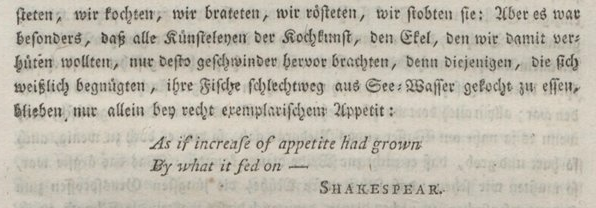Auszeichnung von Zitaten mit Nennung des Urhebers
Zitate mit Nennung des Urhebers werden mittels
<cit> ausgezeichnet. Der eigentliche
Zitattext steht innerhalb eines
<quote>-Elements. Der Urheber des Zitats wird
in <bibl> angegeben. Die Reihenfolge, in
welcher die Elemente <quote> und
<bibl> stehen, folgt den Gegebenheiten der
Vorlage.
Zitat mit Nennung des Urhebers (beispielhaft):
<cit> <quote>[Zitattext]</quote> <bibl>[Urheber des Zitats]</bibl> </cit>
Zitat mit Autor (1)

<cit rendition="#et"> <quote> <hi rendition="#i"> <hi rendition="#aq">As if increaſe of appetite had grown<lb/>By what it fed on —</hi> </hi> </quote><lb/> <bibl> <hi rendition="#aq #k">Shakespear.</hi> </bibl> </cit><lb/>
Zitat mit Autor (2)

<cit rendition="#et #aq"> <quote>Friend to mankind, she glitters from afar,<lb/>Now the bright ev’ ning, now the morning star.</quote><lb/> <bibl>Baker.</bibl> </cit><lb/>
